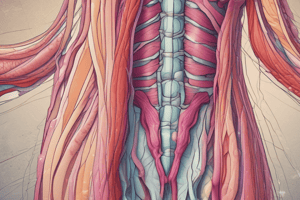Podcast
Questions and Answers
What is the primary function of skeletal muscle?
What is the primary function of skeletal muscle?
- Assisting in respiration
- Regulation of body temperature
- Movement and locomotion (correct)
- Maintenance of posture and balance
Which type of muscle tissue is found in the walls of hollow organs?
Which type of muscle tissue is found in the walls of hollow organs?
- Smooth muscle (correct)
- Cardiac muscle
- Muscle tissue
- Skeletal muscle
What is the ability of muscle tissue to respond to stimuli and contract?
What is the ability of muscle tissue to respond to stimuli and contract?
- Excitability (correct)
- Contractility
- Extensibility
- Elasticity
Which type of muscle tissue is multinucleated and has multiple nuclei?
Which type of muscle tissue is multinucleated and has multiple nuclei?
What is the ability of muscle tissue to return to its original shape after contraction?
What is the ability of muscle tissue to return to its original shape after contraction?
Which type of muscle tissue is responsible for pumping blood throughout the body?
Which type of muscle tissue is responsible for pumping blood throughout the body?
Flashcards are hidden until you start studying
Study Notes
Characteristics of Muscle Tissue
- Muscle tissue is a type of tissue that has the ability to contract and relax
- It is found throughout the body and is necessary for movement, balance, and posture
- Muscle tissue is made up of muscle fibers, which are multinucleated and have multiple nuclei
Types of Muscle Tissue
- Skeletal Muscle:
- Voluntary muscle tissue
- Attached to bones and helps move the body's skeleton
- Examples: biceps, quadriceps, hamstrings
- Smooth Muscle:
- Involuntary muscle tissue
- Found in the walls of hollow organs, such as the digestive tract, blood vessels, and airways
- Examples: muscles in the intestinal wall, blood vessel walls
- Cardiac Muscle:
- Involuntary muscle tissue
- Found in the heart and responsible for pumping blood throughout the body
- Examples: heart muscle
Functions of Muscle Tissue
- Movement and locomotion
- Support and stabilization of joints
- Regulation of body temperature
- Maintenance of posture and balance
- Assisting in respiration and circulation
Properties of Muscle Tissue
- Excitability: Muscle tissue can respond to stimuli and contract
- Contractility: Muscle tissue can contract and generate force
- Elasticity: Muscle tissue can return to its original shape after contraction
- Extensibility: Muscle tissue can be stretched and lengthened
Characteristics of Muscle Tissue
- Muscle tissue has the ability to contract and relax, and is found throughout the body, necessary for movement, balance, and posture.
- It is composed of muscle fibers, which are multinucleated, having multiple nuclei.
Types of Muscle Tissue
- Skeletal Muscle: Voluntary muscle tissue, attached to bones, helping to move the body's skeleton, examples include biceps, quadriceps, and hamstrings.
- Smooth Muscle: Involuntary muscle tissue, found in hollow organs like the digestive tract, blood vessels, and airways, examples include muscles in the intestinal wall and blood vessel walls.
- Cardiac Muscle: Involuntary muscle tissue, found in the heart, responsible for pumping blood throughout the body, example is heart muscle.
Functions of Muscle Tissue
- Enables movement and locomotion.
- Provides support and stabilization of joints.
- Regulates body temperature.
- Maintains posture and balance.
- Assists in respiration and circulation.
Properties of Muscle Tissue
- Excitability: Responds to stimuli, leading to contraction.
- Contractility: Generates force through contraction.
- Elasticity: Returns to its original shape after contraction.
- Extensibility: Can be stretched and lengthened.
Studying That Suits You
Use AI to generate personalized quizzes and flashcards to suit your learning preferences.




